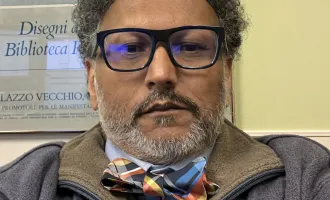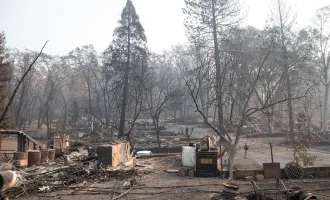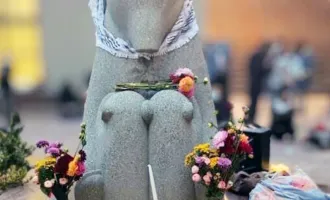
Photo by Matt Popovich on Unsplash
A UCSF Student’s Untold Story: Police Brutality Nearly Derailed Me
To the anonymous author who shared the harrowing story of their encounter with the police (Not All Scars Are Visible: A Classmate’s Tale of Police Brutality): I feel connected to you, somehow, in the crazy way that trauma brings people together.
For a long time, I have considered myself fortunate.
The experience that I share with you has led me to feel fortunate that my life didn’t come to an end by the hands of cops. Had I been a towering Black man, it probably would have.
After years of suppressing feelings of shame, I want to share my story because I need those in the academic bubbles like UCSF to see me.
I want to connect with the homies from the communities the police terrorize rather than serve. The ones who constantly code-switch to fit in this academic bubble.
Increasing diversity and bringing cultures together in a space that is predominantly white means addressing these issues as passionately as we address COVID-19, the 2019 National Academies of Science, Engineering and Medicine report on sexual harassment on women in academic science and medicine, and the recent student visa status crisis.
Here’s my story.
It is my last year of college and I’m going to a party my friend is hosting. The party is poppin’! Music bumpin’, drinks flowin’, hips movin’.
I’m in the back room having a beer and shooting the shit with some friends. It’s not long before I hear pounding coming from the front room. Po-po have come through and are shutting down the party.
Ah man, I just got here. This blows.
Given that we’re in the back room, my friends and I are among the last to leave. I have a question for the cops before I bounce, though.
I approach one of the two cops and ask, “How did you guys get into the apartment? Did you have a warrant or something?”
“We don’t need one to get into an illegal party,” the officer responds.
“Why is it illegal?” I ask. His excuse is that there was underage drinking.
At this point, I’m ready to leave with my friends. The officer I am talking to is patient and courteous, however, at some point I managed to piss off his partner. The partner looks me up and down and says, “Who are you to be asking questions? Get out of here.”
“I was just asking, that’s it.”
“You don’t even look like you’re of drinking age.”
“I am.”
“Let me see your ID. “
I hand it over. He looks at it, he looks at me. And then, quite unexpectedly — “Put your hands behind your back.”
His partner is taken aback and whispers something in the arresting officer’s ear. The partner doesn’t seem on board with what is happening, but the arresting officer is adamant and full-fledged pissed.
What is happening? What? No. What?
The arresting officer repeats himself, each time further raising his voice, his face visibly agitated. I look at his partner, the one I had originally addressed with my questions, and I can see he’s conflicted.
My friends looked panicked. They shout, “You don’t have to do all of that!”
My heart starts racing, palms get sweaty, things are registering slower than a snail’s pace.
“What is happening?”
“Do I have to repeat myself? Put your hands behind your back.”
“What? No. Huh? What did I do? Why?”
“I said, put your hands behind your back!”
My heart is ready to leap out of my chest.
“No. No. Why?” I keep pleading, “Why, what did I do? Are you arresting me?” I ask this multiple times and get the same response each time.
“PUT YOUR HANDS BEHIND YOUR BACK!” He finally answers, “Yes, I am arresting you.”
“But why? What? No.”
He proceeds to put his hands on me. I resist. Man, do I resist. I resist like my life depends on it.
I resist because I have years of martial arts training and here’s some man, who happens to be in a uniform, trying to put his hands on me.
I’m pretty sure my brain shut down — I am just not thinking. I resist. Hell no, yelled every particle in my body. That was a mistake.
The first officer I’d spoken to now shifts positions. He is wholly committed to supporting his partner and tells me to not resist.
His voice seems subdued compared to that of his partner. His voice is gentle.
“Just do as he says,” he tells me. “Don’t resist. It’ll be alright.” The arresting officer is trying to force my hands behind my back. I’m not having it.
Things escalate.
“Why are you arresting me?” I begin to yell. “Why aren’t you reading me my rights?”
The answers come in waves. Disorderly conduct. Shut up. Do as I say and put your hands behind your back.
The arresting officer can’t force my hands behind my back and his partner steps in. Both men are groping me to get the handcuffs on.
They push me against a brick wall. Their uniforms, badges, guns, and walkie talkies are hard pressed against my back. Their hot breaths down my neck.
They kick me to the ground. My knees hit the floor hard. My face is now against the cement. My hands behind my back.
“Get off of me,” I yell, as two knees press onto my back. Hard.
The cuffs are being placed on my wrists.
Then, they pepper spray me. They spray it directly into my eyes with my face pressed on the floor and my hands cuffed.
The pepper spray is all over my face — my eyes and entire nasal passage burn. Their knees are pressed hard on my back.
I can’t find my breath. I can’t breathe. I can’t open my eyes.
At some point, it becomes clear to them that I’m not okay. They call an ambulance.
Despite the loud ringing in my ears, I overhear the arresting officer telling my friend to delete the video she had apparently recorded.
He tells her that she must delete the video in front of him or he would have to arrest her, claiming what she’s doing is illegal. The friend panics and caves.
I don’t want to go to the hospital because I don’t have insurance. An entirely different officer accompanies me to the E.R.
She doesn’t look pleased to spend part of her night with me at the hospital.
She comments, “I heard what you did. That’s not a good look. You assaulted an officer. What kind of drugs were you on?” I stay quiet.
I ask her if she could loosen the cuffs, which are now attached to the bed frame. She looks at me and rolls her eyes.
My thoughts were racing as the adrenaline coursed through my body.
When I could manage to focus, it was mostly about how I had fucked it all up. Graduate school? Out the window. Opportunities destroyed, vanished...gone. What was I going to do?
The doctor tells me that I will be alright. The doctor tells the officer that the drug test came back negative and then tells me that I’m not pregnant.
Getting arrested is a whole process. Hopping from one patrol car to another, I am first taken to the precinct jail cell, and then down to central booking, where I wait a long time for my arraignment.
They process me at the precinct, which consists of asking me “pedigree” questions. Name, DOB, address, SSN, fingerprints, mugshot. The officer gives me a voucher for retrieving my items later.
When walking out of the holding cell towards the captain to hear my charges, I spot a loud-mouthed plain-clothed detective. As soon as he sees me, he stops dead in his tracks and gets close.
“Who is this? Damnnnnn, who arrested this one?” he says to no one in particular.
He keeps looking me up and down. He whistles, winks, and tells me to meet him afterwards.
Humiliation mixes with sickness.
I continue to the captain, who is seated in a high-back, wooden chair on an elevated platform.
He looks down at me incredulously and says to nearby cops, “Her? This little one was the one Officer X couldn’t arrest?”
He tells me that I should consider myself lucky that the arresting officer decided to not press charges.
“I keep telling him he should, but he just doesn’t want to listen,” the captain says to nearby cops as he shakes his head.
“You assaulted an officer.” He shakes his head again and looks at me with so much hate, reads my charges and signals to the others. “Take her away.”
I plead guilty to the charges of disorderly conduct and resisting arrest at the arraignment.
The court had assigned a public defender for me because I couldn’t afford to pay for one. She was sympathetic but rushed.
I was, in fact, guilty of resisting arrest, therefore, I didn’t have much of a case. You see, that was my mistake.
I later learned that if I had not resisted arrest, they probably would have dropped the charges or given me a desk appearance ticket rather than going through the whole arrest process.
I also learned that cops don't need to read your Miranda rights to have it be a lawful arrest.
How do you avoid a fight or flight response when you have done nothing wrong?
If you are being arrested for no reason and if you do resist, you’re automatically guilty of two charges.
The attorney told me that given that it was my first arrest, the records would become sealed if I didn’t get arrested again within the next six months.
Just like that, I had a record and lived up to a negative stereotype I had steered clear from for so much of my life.
What ensued shocked me. I had thought of myself as outgoing, hard-working and resilient. But, after this shake-up, the major pervasive thought was that I wanted to go out and do something bad.
I seemed to have lost the self-preservation mode that I had cultivated through many years.
Honestly, I just wanted to do something stupid, reckless. Obviously, it doesn’t make sense. I guess it is hard to pick yourself up from these situations.
Like the anonymous author that sparked me to share this story, I also worked tenaciously to get to the PhD track- research honors, outreach, summer research experiences at R1 institutions, summa cum laude, all while working.
There was nothing that was going to get in the way, but this experience came damn near close.
During these tumultuous times, UCSF leaders have made me feel alienated.
I wish people had gotten out of their comfort zone and actually addressed police brutality AND the many other issues that underserved, lower income, Black and Brown communities are facing.
It feels ironic that even though race and equity conversations were sparked by the horrific videos of police brutality, of Black men and women dying at the hands of the police, not much about this issue was discussed.
When UCSF leaders choose to address issues of police brutality as if it were a far-removed problem that does not DIRECTLY affect this community, this makes us feel like y’all don’t see us, like we’re invisible, and that our own experiences are not valued.
To be clear, this form of adversity does not define me. But I think it is important to recognize the barriers that exist that may prevent otherwise perfectly capable people from reaching their maximum potential.
Barriers exist. They’re insidious and hurtful to society and most importantly they don’t just cease to exist because you don’t want to talk about it. In fact, barriers only grow and get fortified by willful ignorance and apathy.
Increasing diversity inevitably means that the molds we come from will be vastly different. I strongly believe that UCSF’s mental healthcare center should reflect this intersectionality.
These times are especially triggering for people who directly face these ordeals, who have family members that have lived through these experiences or come from communities where these things regularly occur.
To have an inclusive environment means being mindful of the people that are there. The phenomenon of imposter syndrome has been used in ways to unite us graduate students, but I think it is important to draw a line.
Imposter syndrome for a group of people who are constantly alienated by different tiers in the institution is different. Like when PI’s don’t even address the ongoing Black Lives Matter Movement and police brutality issues plaguing us but have an unprecedented amount of fervor and urgency about COVID anything (research, public health, reopening).
Now that I am in graduate school, I have the luxury of living in a well off, privileged neighborhood that has shielded me from some of the struggles that one faces living in “hard,” heavily policed neighborhoods.
A peaceful living arrangement with no encounters with the police. What has surprised me about graduate school was how it was tough in ways that I would have never imagined.
It was as if life was ready to level up by showing me another face of prejudice — exchanging low-income community problems for strange passive-aggressive behavior, hostile mentoring, and subtle and not-so subtle “micro” aggressions.
Surprisingly, it has not been tough due to the academic rigor. It is tough because it seems like certain people only see you as a diversity statistic, as a number that Graduate Division is trying to fill, as a fail-safe way to acquire money through DEI grants and fellowships.
It is tough because when you finally gather the courage to speak to your PI about uncomfortable, deeply prejudiced patterns of behavior from a colleague, they look for holes in your story, act extremely defensively, and interrogate you more intensely than an 80’s bad cop/good cop movie.
Worst off, when the harasser themselves is that charming PI that would never scream or yell at their student, who do they go to for help?
To anyone attending recent townhalls, it has become increasingly evident that Deans don’t hold much sway over PI’s fiefdoms. It seems like the structures of powerful institutions are devised in a way where there is no oversight and where the fear of retaliation keeps people silent.
Graduate school has taught me that abuse of power is ubiquitous and comes in so many different flavors.
This is the time to reflect broadly and deeply about race and equity issues and to begin introspection. Why is there so much push back when people share their dismal experiences in powerful institutions (police departments, academic institutions)? I believe it is a combination of ignorance and selfishness.
Elite academic institutions have ignored the unique struggles of BIPOC and/or underserved communities for far too long.
As an institution that promotes values such as excellence, diversity, and respect, kindly put your money (I'm talkin' that DEI grant chedda') where your mouth is.
As I look to the future, I see myself having beautiful Brown kids. I’ve had to grapple with the following question: Will I teach them how to “best behave” when dealing with the cops?
Yea, probably, I would be negligent if I didn’t. If they choose to pursue higher education, will I need to share tips on how to code switch, on how to best approach talking to a cis, white male PI, and how to not come off too strong?
PS: I want to shout out all the members of the registered campus organizations (RCO’s) for putting so much energy into positive change.
I see you, Society for Advancement of Chicanos and Native Americans (SACNAS), Scientists for Diversity (S4D), Lesbian, Gay, Bisexual, Transgender, Queer Student Association (LGBTQSA), Native American Health Alliance (NAHA), Women in Life Sciences (WiLS), Humans of UCSF (newest), and the Science Policy Group (SPG), to name a few. Thanks for constantly and actively seeking reform, and not just in our UCSF academic bubbles. We are in fact, full humans capable of so much.
Like Rosalind Franklin said “Science and everyday life cannot and should not be separated.” If these RCO’s sound foreign, you better get to steppin'.


